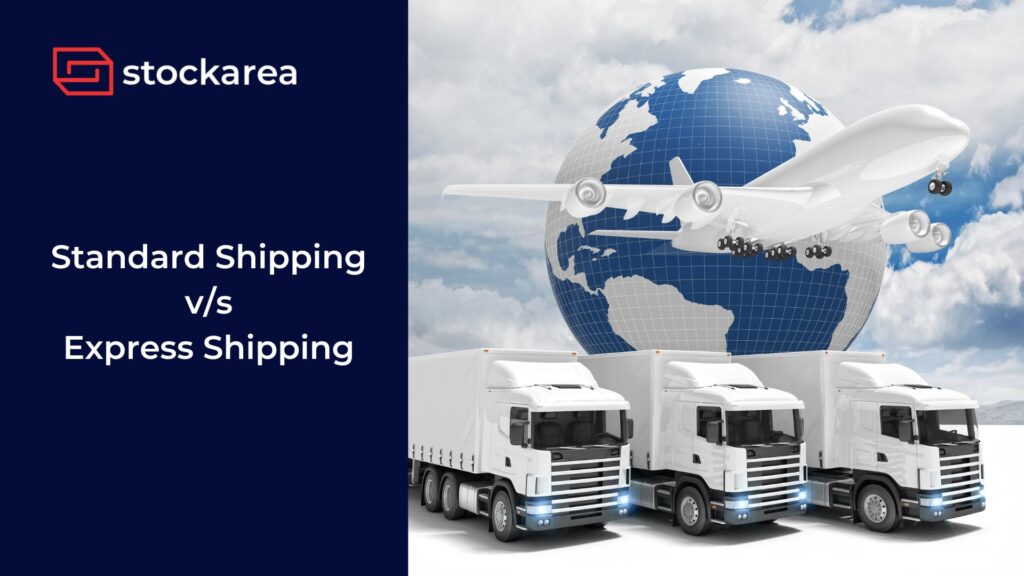Customers anticipate timely, reliable and quick delivery of their products. E-commerce has fueled this demand, offering various shipping options to cater to diverse customer needs. Two primary choices stand out: Standard and Express shipping. In today’s interconnected world, the choice between standard and express shipping can significantly impact the delivery experience for consumers and businesses alike. Each method comes with its own set of advantages and drawbacks. In this blog post, we’ll delve into the key differences between Standard Shipping vs Express shipping, helping you make informed decisions for your online shopping or business operations.
What is Standard Shipping?
Standard shipping refers to the conventional yet the most popular method of shipping goods. This method is known for its cost-effectiveness but usually comes with longer delivery times compared to express options. The parcels aren’t shipped overnight or expeditiously delivered but rather typically transported by ground or sea.
What is Express Shipping?
Express shipping, on the other hand, offers accelerated delivery times, often using air freight or dedicated courier services. It prioritizes speed over cost, making it ideal for urgent deliveries or time-sensitive items, often overnight or within a few days. This service is most beneficial for time-sensitive shipments, such as urgent gifts, important documents, or perishable goods.
8 Key Differences: Standard Shipping vs Express Shipping
1. Cost
- Standard Shipping: Standard Delivery is generally more economical, especially for larger or non-urgent shipments. It is categorized by lower cost per shipment due to slower delivery times and less stringent handling.
- Express Shipping: On the other hand, Express Shipping boasts a higher cost per shipment due to expedited services, priority handling, and often air transportation.
2. Delivery Time
- Standard Shipping: It takes several business days, depending on the distance and carrier, ranging from several days to weeks.
- Express Shipping: Express Shipping guarantees faster delivery, often overnight or within 3 days domestically. For international couriers, the delivery time might be slightly longer.
3. Reliability
- Standard Shipping: Generally reliable, but delivery times can fluctuate based on factors like weather and carrier performance.
- Express Shipping: Highly reliable as it minimizes unforeseen delays & guarantees delivery dates and timeframes.
4. Insurance
- Standard Shipping: Limited, but basic insurance coverage can be included or made available at an additional cost.
- Express Shipping: Typically includes higher insurance coverage for protection against loss or damage.
5. Tracking
- Standard Shipping: Tracking information is available, but updates such as delivery time or parcel location may be less frequent.
- Express Shipping: Detailed & Advanced tracking information is provided, allowing for real-time shipment monitoring.
6. Dispatch from Warehouse
- Standard Shipping: Shipments are often consolidated for efficiency, leading to potential delays. It often involves longer processing times at the warehouse before dispatch.
- Express Shipping: Shipments are prioritized and processed quickly to meet delivery deadlines.
7. Sustainability & Environmental Impact
- Standard Shipping: Generally more eco-friendly due to slower transportation and potentially less packaging.
- Express Shipping: This can have a higher environmental impact due to faster transportation, often by air, and increased packaging for protection. It also is a major cause of higher carbon footprint due to frequent air transportation and expedited delivery requirements.
8. Customer Experience
- Standard Shipping: Customers may experience longer wait times but appreciate lower costs.
- Express Shipping: Customers enjoy faster delivery times and increased convenience but pay a premium.
What is Better - Standard Shipping or Express Shipping?
The optimal choice between Standard and Express shipping depends on various factors:
- Urgency: Express shipping is the best option if time is of the essence.
- Budget: Standard shipping is more cost-effective for non-urgent items.
- Item Value: High-value or fragile items may benefit from the additional insurance and handling of Express shipping.
- Customer Expectations: Consider your target audience’s preferences and expectations for delivery speed.
- Business Needs: If you operate in a time-sensitive industry, Express shipping might be essential for customer satisfaction.
Meanwhile, you can also evaluate additional factors such as:
- Carrier Selection: Different carriers offer varying levels of service for both Standard and Express shipping. Compare options to find the best fit for your needs.
- Packaging: Proper packaging is crucial for both shipping methods, but especially for Express shipping to protect against the rigours of faster transportation.
- Shipping Address Accuracy: Accurate shipping information is essential for timely delivery, regardless of the shipping method.
In conclusion, while each shipping method has advantages, you will be better able to choose the one that best suits your logistical needs and values if you are aware of the differences between them in terms of cost, delivery time, dependability, insurance, tracking, dispatch, sustainability, and customer experience. By making an informed choice, you can ensure efficient and satisfactory delivery experiences for yourself or your customers.
Related posts
- Top 10 Warehousing Companies In Bhiwandi
- Prepare Your Supply Chain For The Holiday Season In 2024
- Only Technology Can Solve the Industrial Supply Chain Crisis
- 5 Key Differences Between Supply Chain Management & Logistics
- Top 10 Freight Forwarding Companies In Bangalore
- 3PL In Supply Chain: Challenges and Opportunities
- 8 Most Common Types of Shipping Methods
- Top 10 Logistics Trends To Look Out In 2024
- Top 10 Reasons To Choose Decentralized Warehousing
- Top 10 Customs Clearance Agents In Bangalore
- CPFR In Supply Chain Management: A Comprehensive Guide
- 7 Proven Ways To Improve Your Supply Chain Management (SCM)
- How To Achieve Supply Chain Excellence In Manufacturing
